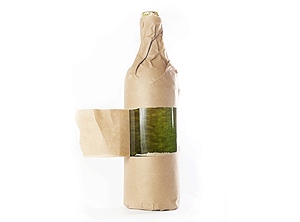RECYCLING UK
Efforts to “go green” with new packaging often ends in failure: Recoup / Temptation to reduce everything to one measure must be resisted
 Just because it is not plastic does not make it environmentally friendly (Photo: PantherMedia/triocean2011) |
UK recycling organisation Recoup (Peterborough; www.recoup.org) has warned manufacturers that switching materials used in packaging as part of a plastics-reduction strategy without considering their recyclability could lead to problems further down the recycling chain.
Companies are increasingly seeking to boost their “green” credentials by moving from “harmful” materials to ones that appear more environmentally friendly, Recoup said, but in a new report, the organisation highlights that the result is that some new packaging products are actually harder to recycle.
In a paper entitled “Material Substitution: Material Switching and the Effect on Recyclability”, Recoup argues that understanding how to improve the footprint of a company was vital in the challenge to manage unintended consequences of climate change.
Related: Uniform data needed for effective household waste collection – Recoup study
However, it said “the temptation to reduce everything to one measure must be resisted. The most suitable package is the one that fulfils the requested function and minimises the total impact of the product over the full life cycle. Choosing the right combination is crucial.”
For example, swapping to paper or cardboard to contain liquids required a plastics laminate layer to make the container waterproof, which consumers would either be unaware of, and unable – or unwilling – to remove before recycling, effectively making the packaging ‘single-use’ and rendering its environmental credentials worthless.
Recoup said it was vital that stakeholders gained a better understanding around the mechanics of recycling. In particular, “providing the consumer with reliable and accurate instructions when it comes to deciding how and where to dispose of used plastics is vital”.
“Often the impact of packaging production is the main focus when considering environmental factors, but this can result in unintended consequences when the packaging cannot be recovered for recycling.
“Packaging needs to be free from such claims, which is relaying incorrect and irrelevant information, the messaging should be clear to enable the user to dispose of in the correct collection system,” it added.
Companies are increasingly seeking to boost their “green” credentials by moving from “harmful” materials to ones that appear more environmentally friendly, Recoup said, but in a new report, the organisation highlights that the result is that some new packaging products are actually harder to recycle.
In a paper entitled “Material Substitution: Material Switching and the Effect on Recyclability”, Recoup argues that understanding how to improve the footprint of a company was vital in the challenge to manage unintended consequences of climate change.
Related: Uniform data needed for effective household waste collection – Recoup study
However, it said “the temptation to reduce everything to one measure must be resisted. The most suitable package is the one that fulfils the requested function and minimises the total impact of the product over the full life cycle. Choosing the right combination is crucial.”
For example, swapping to paper or cardboard to contain liquids required a plastics laminate layer to make the container waterproof, which consumers would either be unaware of, and unable – or unwilling – to remove before recycling, effectively making the packaging ‘single-use’ and rendering its environmental credentials worthless.
Recoup said it was vital that stakeholders gained a better understanding around the mechanics of recycling. In particular, “providing the consumer with reliable and accurate instructions when it comes to deciding how and where to dispose of used plastics is vital”.
“Often the impact of packaging production is the main focus when considering environmental factors, but this can result in unintended consequences when the packaging cannot be recovered for recycling.
“Packaging needs to be free from such claims, which is relaying incorrect and irrelevant information, the messaging should be clear to enable the user to dispose of in the correct collection system,” it added.
24.08.2022 Plasteurope.com [251001-0]
Published on 24.08.2022
